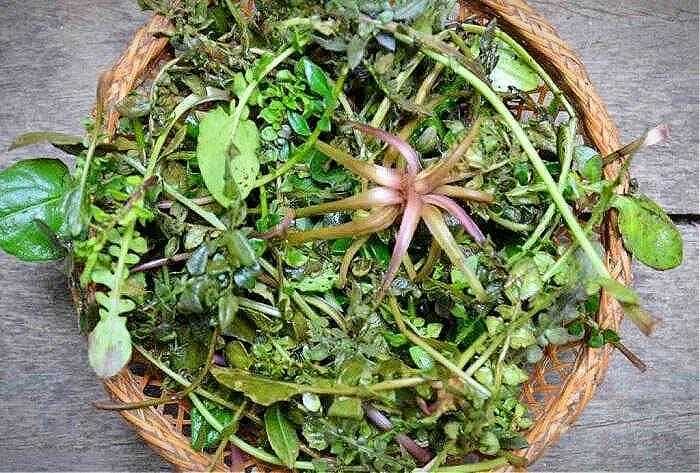Wild edible vegetables have been a traditional salad dish of Greek cuisine for millennia, with written reports of their consumption dating back more than 2,500 years.
The vegetables grow naturally, with no human intervention whatsoever, and are again the center of attention after scientific research demonstrated their importance to the health of the Greek people, especially the Cretans.
Knowledge about the wild vegetables of our country is fading from generation to generation, but fortunately, there are still people who keep the tradition alive.
“By analyzing a total of 70 species of vegetables, we found that the wild vegetables are those that can better protect from various types of cancer and heart disease,” Antonis Kafatos, a professor of preventive medicine and nutrition at the University of Crete’s medical school, said in a report.

Photo: Greek Gastronomy Guide
“They contain many antioxidants that protect us from oxidative stress, which is responsible for carcinogenesis and atherosclerosis,” Kafatos added. “They also protect the cell membrane and the DNA from toxic agents, such as dioxins. The rural populations of the past, wisely acting, used to mix 20 to 30 different kinds of vegetables in the pies they made every day.”
See Also:Cooking with Olive OilKallia Gianitsopoulou, a clinical dietician and nutritionist based in Athens, provided a thorough overview of the traits and health benefits of the vegetables.
“The wild edible vegetables are rich in minerals including calcium, iron, magnesium, sodium and potassium,” Gianitsopoulou told Olive Oil Times. “They also contain a lot of vitamins, such as B, C and A‑carotene, and exhibit antioxidant behavior.”
“They are low in carbohydrates and protein and they do not burden the human body with unnecessary fat,” she added. “A diet rich in vegetables seems to counteract many potential threats to human health that relate to our lifestyle: it relieves stress, improves the condition of the bones of the human body, tames the toxins, helps reduce the bubble of gas in the stomach and metabolize the iron.”
Wild veggies prepared at home or in restaurants are always served with olive oil, the perfect complement to bring out their flavor and nutrients.
“The combination of the vegetables with olive oil is very important,” Gianitsopoulou said. “Research carried out 10 years ago showed that when we consume a salad with oil, we absorb more antioxidants from the veggies. On the other hand, those who consumed the salad with no oil hardly absorbed any of the beneficial ingredients of the vegetables.”
“The high intake of vegetables is crucial in adjusting our blood pressure, and consuming them with lean protein like fish or chicken and extra virgin olive oil is the ideal combination of nutritional sources of macronutrients in our diet,” she added.
Popular among Greek people, wild veggies are also a treat for foreigners visiting Greece in search of new flavors, said Matina Koumertas, a tavern owner on the island of Naxos, in the Aegean Sea.
“Our island is known for the traditional food products it grows and makes like potatoes and cheese, and our wild vegetables are also a point of reference,” Koumertas told Olive Oil Times.
“The tourists who visit our island, before the pandemic that is, usually prefer the Greek salad as a side or even a main dish, but quite a few of them are well-informed about our local products and they order a portion of wild veggies which they really enjoy,” she added.
“Of course, we cultivate vegetables, but their wild cousins are way better,” Koumertas continued. “There are no tastier and more nutritional greens than these and they are all organic.”
Wild vegetables can be bought in farmers’ markets, grocery stores and supermarkets, but hand-picking them in the mountains is a unique experience that requires some knowledge and practice.
“Anyone can start picking wild vegetables and there are some relevant books to read, but it is always better to learn from someone who already knows how to do it,” said Panayiotis Sainatoudis, the founder of Peliti. The group promotes the protection and the continuation of the indigenous plant varieties and seeds of Greece.
“They are available almost all year round,” he told Olive Oil Times. “Depending on the season, we can collect dandelions and sow thistle in the autumn, wild fennel, wild leek and sorrel or asparagus in the spring, and even capers in the summer, if we happen to be on an island.”
“Of course, we must be able to discern the edible vegetables from those unsuitable for consumption and avoid picking them near the roads as they can contain lead from the car exhausts,” Sainatoudis added. “We should also avoid uprooting the whole plant and use a knife instead, causing the least damage possible so that the plant can grow again.”
Sainatoudis highlighted how the Covid-19 pandemic has led more people to visit the mountains for some fresh air and veggies.
“Back in the day, mostly the women used to collect wild vegetables in Greece,” he said. “It was a chance for them to spend some time together away from their homes. Today, and with the two lockdowns we have experienced, I see a lot of people who pick wild vegetables for the same reason, to go outside, maybe meet some friends, and relax.”
While Greek natives are used to consuming wild veggies, foreigners visiting the country are not accustomed to this type of food.
“We Greeks consume wild veggies systematically, and they are present on the menus of small taverns and also gourmet restaurants,” he said. “Over the years, in our group, we have cooperated with a lot of volunteers from abroad, who had never heard about wild veggies before.”
“When we put them on the table, they just could not comprehend that we had picked them ourselves. We washed them and then boiled them. But they liked what they tasted,” he added. “Greece is very rich in wild edible vegetables, and they have helped the population to survive some tough times in the past.”
“Inevitably, the knowledge about the wild vegetables of our country is fading from generation to generation, but fortunately, there are still people who keep the tradition alive,” Sainatoudis concluded.








